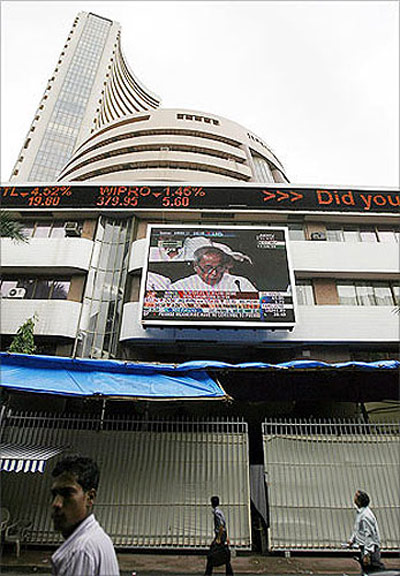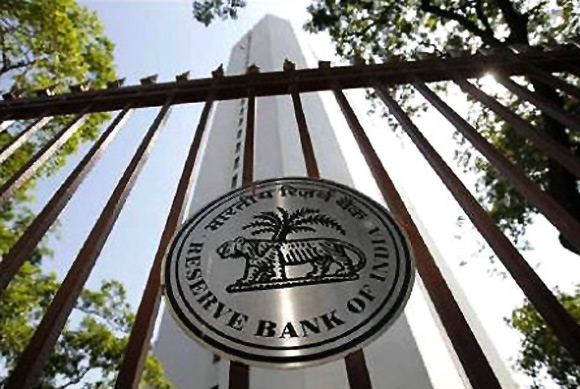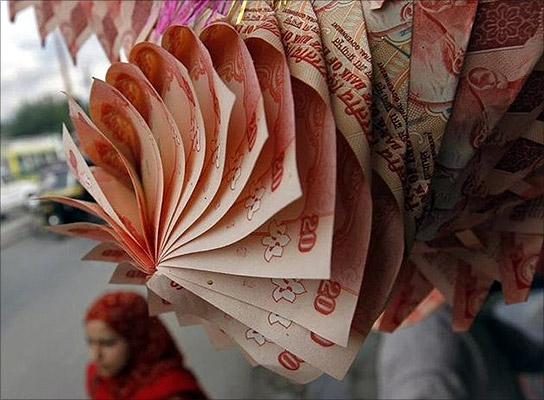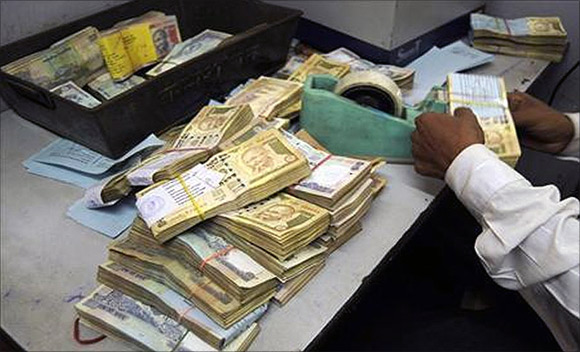Photographs: Reuters Abheek Barua
The response by the finance ministry and the RBI to the churning in financial markets is mature, says Abheek Barua.
I think it would be fair to commend the way both the government and the central bank have handled the recent turmoil in the financial markets.
Instead of the uber-garrulous officials associated with the previous regime at North Block, whose sole agenda seemed to be to deny even the slightest suggestion of trouble, this time we have seen a measured response from the finance ministry.
The objective this time has been to put things in perspective rather than claim that the problem does not exist.
While the finance minister and his two deputies have asserted that they do have a choice of policy weapons to deal with the pressures on the markets, none of them has claimed to possess a silver bullet that would somehow rid the economy of its current woes.
The decision not to announce a sovereign or quasi-sovereign bond at the peak of the turmoil could have signalled panic, and perhaps it was wise to hold back (I, however, firmly believe that as things calm down, a dollar bond issue is imperative).
…
How FM, RBI handled the economic crisis
Image: RBI Headquarters.Photographs: Reuters
Quick decisions like the new gas pricing policy are no doubt controversial, but they seem to be giving investors the sense that the government has got off its haunches and is doing its bit to improve the investment environment. Apparently, a number of new initiatives are in the pipeline.
On the central bank front, I have found two key changes reassuring. First, the frequency of communication has reduced. This, I have learnt from experience, helps rather than hurts in times of severe crisis.
The more the number of sound bites from policy makers, the greater is the scope for confusion and the consequent volatility in the markets. Second, the bulk of the communication from the central bank on the rupee and markets has been coming from the governor, and not from his deputies.
...
How FM, RBI handled the economic crisis
Image: A Kashmiri woman walks under a garland made of rupee notes on display at a market in Srinagar.Photographs: Fayaz Kabli/Reuters
While the central message has not been any different from the past - that it is somewhat pointless to lean against the hurricane of a pan-emerging market currency sell-off - the fact that it has come from the top boss has made a difference.
Thus, while it might sound a little ironic given the fact that the rupee has tumbled by 10 per cent over the past month, I would claim that the panic both in the markets and among companies has been much less than in past episodes.
Thus, investors and companies' chief financial officers seem to have reconciled themselves to the fact that the pressure on the rupee is the inevitable consequence of a major global churning.
...
How FM, RBI handled the economic crisis
Image: Rupee notes are stapled to form a garland at a market in Srinagar.Photographs: Fayaz Kabli/Reuters
The question, however, remains: when and where will the rupee - and other markets - find equilibrium? There is a view (which I partly share) that the global markets' reaction to the US Federal Reserve's tentative announcement of the "tapering" of quantitative easing (QE) has been a little too aggressive.
It is possible that the markets will recognise and respond to a couple of things. First, the commitment to withdrawing QE3 by the middle of 2014 is contingent on a certain kind of macroeconomic situation panning out in the US and does not constitute a rigid timeline.
Second, the Fed is quite terrible at forecasting growth - its current assessment of growth going forward (on which the QE3 withdrawal is based) seems aggressive. Thus, the withdrawal of the Fed's money-printing spree might not be that abrupt after all; and once that is factored in, asset markets might recover a tad.
...
How FM, RBI handled the economic crisis
Photographs: Nguyen Huy Kham/Reuters
That said, there can be little doubt that the Fed is indeed serious about winding down the bond-buying programme and this will mean a staggered reduction in global liquidity at least through 2014.
The next question is: will asset classes recover uniformly across the board or will there be a significant difference in their relative pace? I would argue that the anxiety over the Fed's QE withdrawal plan has triggered a process of reassessing the fundamental prospects of the larger emerging markets such as China, Brazil and India.
This reassessment has now acquired a momentum of its own and has led investors to focus more closely on these emerging market economies' specific risks and vulnerabilities.
...
How FM, RBI handled the economic crisis
Image: Rowers sit in a 62 metres (203.4 feet) long dragon boat on the Yangtze River in Zigui County, Hubei province.Photographs: Reuters
This has resulted in a process of what the jargon describes as "de-rating" of these markets. Thus, even if the Fed were to slow down the pace of withdrawal, it is possible that the larger emerging market countries - including India - might tend to underperform other asset groups. In short, while some relief is possible on the rupee front, it might not be large.
To be fair, some of this pessimism about emerging markets is legitimate. Take China. The concerns about this emerging market mammoth no longer pertain to a cyclical slowdown in growth.
They are more about the likelihood of its various structural problems: bad loans sitting in the heavily leveraged local government financial vehicles; its massive shadow banking system that services wealth management needs; the decline in its share of global exports as a result of falling competitiveness; and finally, its overheated housing market, which perpetually seems to collapse.
...
How FM, RBI handled the economic crisis
Image: An employee counts rupee notes.Photographs: Reuters
Brazil has its own set of problems that its government seems to address through ad hoc measures whose efficacy is suspect. We are all aware of India's problems and I will not waste precious column inches repeating them.
The upshot is the following. First, the episodes of pullbacks notwithstanding, the rupee will probably be on a depreciation course going forward and investors are likely to factor in this currency risk while responding to any rupee-denominated supply of paper.
Potential issuers, including the government, have to keep this in mind and should not be lulled by a temporary reprieve in the currency market.
Second, any sustained sense of succour in the currency market - which will spill over into other asset markets - can come from large one-off supply of dollars. If the markets do settle down a bit, shouldn't we consider issuing quasi-sovereign dollar bonds?








article